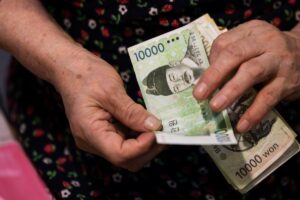In a dramatic turn of events, South Korean President Yoon Suk Yeol’s unexpected declaration of martial law has sent shockwaves through financial markets, marking the first such move in over four decades. The announcement, which accused the opposition of undermining his government, was quickly reversed, leaving investors and traders reeling from the volatility that ensued.
### Immediate Market Response
The financial implications of Yoon’s announcement were swift and severe. South Korean exchange-traded funds (ETFs), the national currency (the won), and key stock players all saw sharp declines. Notably, the iShares MSCI South Korea ETF dropped by as much as 7.1% during U.S. trading hours, while shares of industry giant Samsung Electronics plummeted by 7.5%. Even more telling, the Korean won depreciated significantly, sliding 2.9% to reach 1444.65 per dollar during the early trading session.
In response to the urgency of the situation, South Korean authorities promised “unlimited liquidity” to stabilize the markets, a commitment that momentarily eased investor panic. However, the rapid reversal of the martial law declaration only compounded the uncertainty facing investors in a region already beset by external pressures, including looming tariff changes under the new U.S. administration.
### The Broader Economic Picture
This incident is unlikely to be an isolated occurrence in the annals of South Korea’s political landscape. According to industry analysts, the martial law declaration will cast long shadows over future investment in Korea. As Mark Ledger-Evans from Ninety One UK Ltd. points out, the situation could lead to a higher risk premium for investors looking to enter or maintain positions in Korean assets.
In addition to the sharp declines experienced by domestic stocks, U.S. companies with substantial ties to the region have also suffered. E-commerce giant Coupang saw its stock fall by nearly 9.8%, alongside significant losses from other South Korean firms. The Korean Exchange has taken notice and is currently reviewing trading activities, reflecting the seriousness of the situation.
### Implications for Foreign Investors
The global implications of South Korea’s recent tumultuous events cannot be ignored. Nour Al Ali, a macro markets strategist, highlights that while the immediate fallout has mainly affected local assets, the interconnected nature of global economies means that investors worldwide should remain vigilant. South Korea’s significant trade relationships mean that political discord can lead to ripples far beyond its borders.
Investors are not only observing the macroeconomic indicators but are also honing in on specific sectors, such as semiconductors. Joe Gilbert from Integrity Asset Management suggests that disruptions to major producers like Samsung could potentially elevate semiconductor stocks in the short term, offering a glimmer of opportunity amidst the chaos.
### Looking Ahead
The measures put in place by South Korean financial authorities signal a commitment to market stabilization. With promises of unlimited liquidity from the finance ministry and an extraordinary meeting convened by the Bank of Korea, investors hope for a swift return to normalcy. While markets are scheduled to open as usual at 9 AM local time, the recent volatility raises questions concerning investor sentiment moving forward.
### Conclusion
As the situation continues to unfold, it emphasizes the necessity for investors to remain adaptable and informed. Uncertainties such as these underline the importance of having a well-diversified portfolio and the readiness to pivot as market conditions change. In an era where one decision can unravel market stability, proactive strategies are not just recommended—they are essential.
For more analysis and expert insights into rapidly changing market conditions, stay connected with Extreme Investor Network. Our committed team ensures that you’re always one step ahead in navigating the complexities of global finance.

